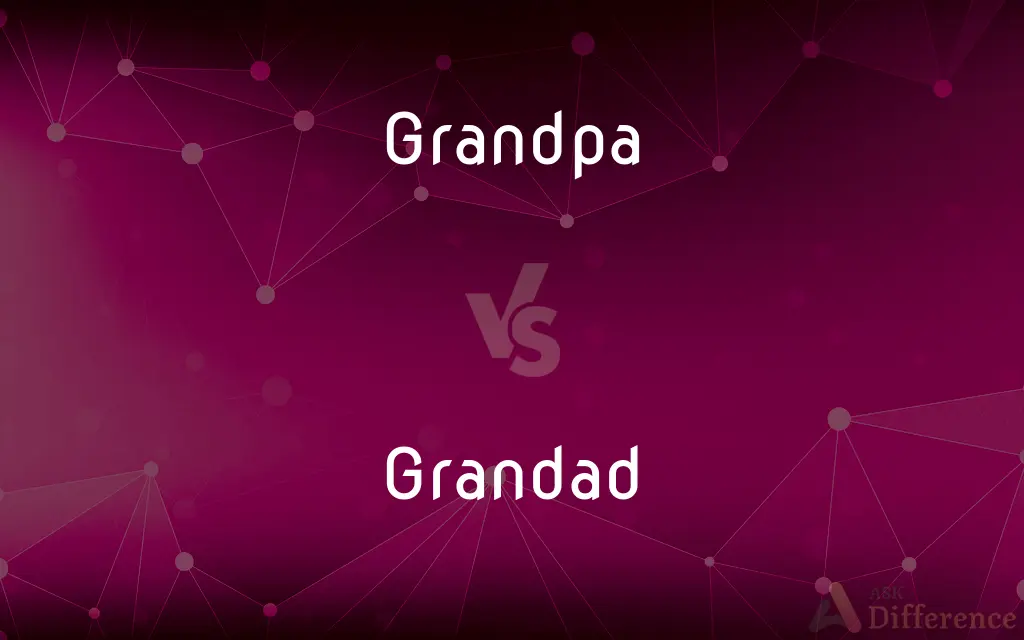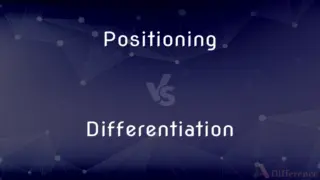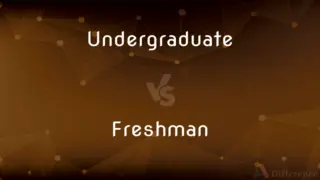Grandpa vs. Grandad — What's the Difference?
By Maham Liaqat & Urooj Arif — Updated on March 28, 2024
"Grandpa" and "Grandad" are affectionate terms for a grandfather, with "Grandpa" being more commonly used in American English, while "Grandad" finds more favor in British English.

Difference Between Grandpa and Grandad
Table of Contents
ADVERTISEMENT
Key Differences
The terms "Grandpa" and "Grandad" both refer to the father of one's parent, embodying a beloved and respected family role. While both terms convey warmth and familial affection, their usage largely depends on regional dialects and family traditions. "Grandpa" is frequently used in the United States, reflecting a casual and affectionate way to refer to one's grandfather. On the other hand, "Grandad" is more prevalent in the UK, offering a similarly endearing reference but with a distinct British flavor.
The choice between "Grandpa" and "Grandad" may also reflect personal or familial preference, independent of geographical location. Some families might opt for "Grandpa" for its brevity and familiarity, while others prefer "Grandad" for its traditional feel or simply because it has been passed down through generations. This choice is often influenced by what sounds most natural within the context of family interactions and what term the grandfather himself prefers.
In literature and media, the portrayal of a "Grandpa" or "Grandad" can subtly differ, with "Grandpa" sometimes depicted as the wise, jovial patriarch in American stories, whereas "Grandad" might be portrayed with a touch of British stoicism or quirkiness. However, these portrayals are not strict, and the essence of the relationship, marked by wisdom, love, and guidance, remains central to both terms.
Cultural expressions and celebrations of grandfathers, such as Grandparents' Day, do not differentiate between "Grandpa" and "Grandad." Instead, the focus is on the universal role grandfathers play in providing family heritage, stories, and love. The choice of term does not change the profound impact these figures have on their families, showcasing the deep bonds that transcend linguistic preferences.
Ultimately, whether one uses "Grandpa" or "Grandad" is less about the specific term and more about the affection and respect it denotes. Both terms signify a cherished relationship that plays a significant role in family dynamics and individual development, emphasizing the timeless and borderless nature of familial love.
ADVERTISEMENT
Comparison Chart
Usage
More common in American English.
More common in British English.
Connotation
Casual, affectionate.
Endearing, with a traditional flavor.
Regional Preference
United States
United Kingdom
Depiction in Media
Often wise and jovial.
May be portrayed with British characteristics.
Influence on Family Dynamics
Emphasizes wisdom and love.
Similarly emphasizes wisdom, love, with a touch of tradition.
Compare with Definitions
Grandpa
A grandfather, especially in American English.
Grandpa Joe loves to tell stories of his youth.
Grandad
A term for a grandfather, prevalent in British English.
Grandad Arthur has a collection of antique radios.
Grandpa
Can denote a wise, older family patriarch in media.
Grandpa in the movie was the family's moral compass.
Grandad
Often portrays a slightly stoic but loving figure in British stories.
Grandad's subtle humor is legendary in our family.
Grandpa
Reflects a close, loving relationship.
My Grandpa taught me how to play chess.
Grandad
Carries a traditional, affectionate connotation.
Grandad's stories from his navy days are fascinating.
Grandpa
Often used affectionately by grandchildren.
I'm spending the weekend fishing with Grandpa.
Grandad
A term passed down through generations.
We've always called him Grandad, just like my father did.
Grandpa
Embraced in various family traditions.
Every Christmas, Grandpa dresses up as Santa for the kids.
Grandad
Symbolizes a cherished familial bond.
Sunday roasts at Grandad's house are a family tradition.
Grandpa
(informal) grandfather
Grandad
Alternative spelling of granddad
Grandpa
One's grandfather.
Grandad
The father of your father or mother
Grandpa
A grandfather.
Grandpa
A grandfather.
Grandpa
The father of your father or mother
Common Curiosities
How do I decide whether to call my grandfather Grandpa or Grandad?
It often comes down to family tradition, personal preference, or what your grandfather prefers to be called.
Does the term used affect the role of the grandfather in the family?
No, the term does not change the role or importance of a grandfather within the family; it's merely a linguistic preference.
Can the term used influence how grandchildren perceive their grandfather?
While the term itself may carry slight cultural nuances, the relationship and individual personality of the grandfather have a far greater impact.
Which term is more commonly used internationally?
"Grandpa" tends to be more universally recognized, especially due to American media, but "Grandad" is equally understood in English-speaking countries.
Can I use both Grandpa and Grandad?
Yes, the choice between the two can depend on personal or family preference, and some families use both interchangeably.
Are there variations of Grandpa and Grandad?
Yes, variations like "Gramps" or "Grandaddy" can add further personalization to what grandchildren call their grandfathers.
Is there a difference in meaning between Grandpa and Grandad?
No, both terms affectionately refer to a grandfather, with the main difference being regional usage.
Is one term more formal than the other?
Not necessarily, both are informal and affectionate, though some might perceive "Grandad" as slightly more traditional.
Are there other terms for grandfather besides Grandpa and Grandad?
Yes, many cultures and languages have their unique terms for a grandfather, such as "Nonno" in Italian or "Opa" in German.
How do I teach my child which term to use?
Introduce the term you prefer or that your family traditionally uses, but also explain that both terms are correct and affectionate.
Share Your Discovery

Previous Comparison
Positioning vs. Differentiation
Next Comparison
Undergraduate vs. FreshmanAuthor Spotlight
Written by
Maham LiaqatCo-written by
Urooj ArifUrooj is a skilled content writer at Ask Difference, known for her exceptional ability to simplify complex topics into engaging and informative content. With a passion for research and a flair for clear, concise writing, she consistently delivers articles that resonate with our diverse audience.














































